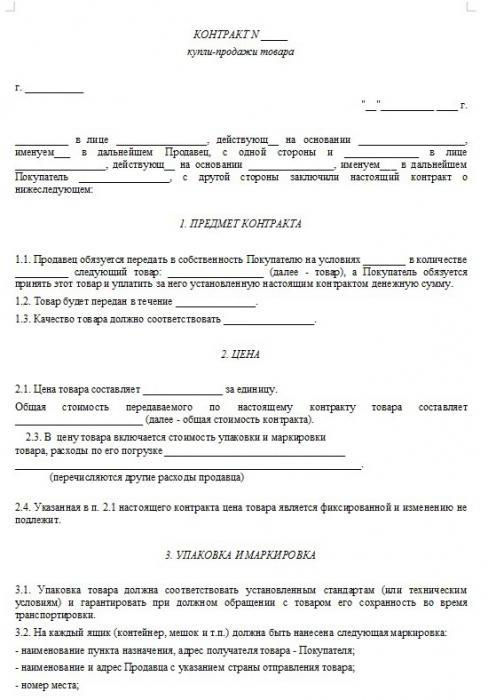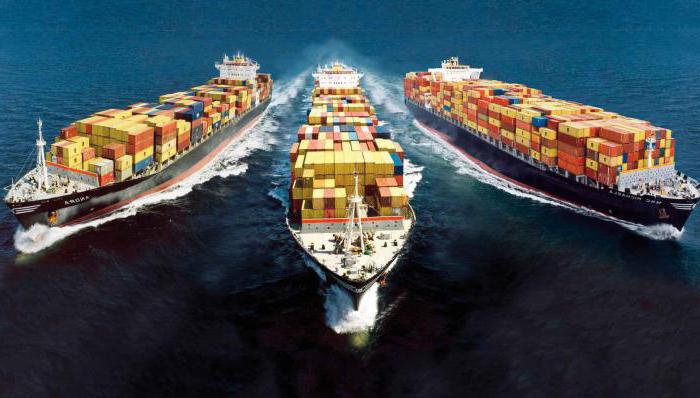Beginning entrepreneurs quite often ask how trade with other countries is carried out. Most often, a special agreement is concluded for conducting foreign economic activity, namely, a foreign trade contract. In this article, we consider the types of these agreements, as well as their structure and stages of conclusion, and also consider a sample of a foreign trade contract.
Description
A foreign trade contract is a generalizing term that is used in relation to transactions signed by two or more trading participants located in the area of responsibility of different states. The foreign trade international contract is intended to cover the following points:
- The intentions of the parties, the volume and quantity of deliveries of goods and the provision of services.
- The amount of cash payments under the contract.
- Rights and obligations of parties to the transaction.
Documentary basis for international cooperation
This agreement is considered the main document on the basis of which foreign trade activity is possible. The Vienna Convention of 1980 enshrined all the basic principles of such agreements. The Convention, therefore, has become a substitute for earlier international agreements. In 1988, the Soviet Union joined the Vienna Convention. To date, it has been signed by 85 countries, including the entire European Union, the USA, Japan, South Korea, Egypt, Turkey, Israel, Iraq, etc.
Types of foreign economic contracts
Depending on the subject of the transaction and the type of foreign trade transactions, several types of agreements are distinguished. A sample of the foreign trade contract is presented. So, each species has its own characteristics and is significantly different from the other. The main forms of foreign trade agreements include:
- Contract of sale.
- Agreements involving the acquisition of intellectual property rights.
- Leasing.
- Travel arrangements.
The vast majority of foreign economic contracts are sales contracts.
Temporary types of foreign trade agreements
Agreements also differ in terms of delivery time. This classification includes:
- One-time. The contract provides for only one supply of certain goods, after which it is canceled. Such agreements are used to implement fast delivery, for example, in the case of perishable products, or slow, for example, expensive equipment.
- Urgent. Used if the buyer needs to deliver the goods by a certain date, while all other conditions are insignificant. For example, such foreign economic contracts are signed upon delivery of seeds for sowing.
- Perpetual and long-term. Used if it is necessary to periodically deliver specific, most often the same type of goods. Such agreements are concluded either for a very long period or have no term at all. An example of such a foreign trade agreement is the acquisition of minerals in one country for processing in another.
Types of contracts by payment method
The following types of agreements are also distinguished by the form of payment:
- Payment by cash. It involves the transfer to the supplier of the amount in monetary terms. Moreover, the international contract should describe in detail the methods and form of transfer, currency of payments, etc.
- Payment for goods specified in the contract.A certain quantity of goods is transferred to the supplier. The contract should contain detailed information about the quality and quantity, type of goods and other parameters required by the parties to the agreement. In fact, such a contract can be called barter.
Typification of agreements on special grounds
The following types of foreign trade contracts are distinguished by their characteristic features:
- Intentions. The contract establishes the importer’s intention to purchase a particular product from a seller located in another country. A feature of this type of foreign trade contract is the minimum degree of responsibility of the importer to the seller.
- Framework. The agreements contain general provisions on which certain deliveries and work will be carried out. Clauses of the contract may be supplemented and amended. Typically, framework contracts are concluded in situations where it is not possible to determine the cost of upcoming work.
- Preliminary. In fact, it is also a contract of intent. The parties undertake to conclude a full-fledged foreign trade contract for the supply of goods and services. The main difference from the intention is that if you violate the clauses of the contract or introduce clauses that contradict the preliminary agreement, the party will incur fines covering the losses of other parties to the transaction.
- Special. They are concluded in the case when one of the parties assumes the obligation to carry out specific works, for example, installation, planning, geological exploration, supply of specialized products, etc.

The structure of the foreign trade contract
Any foreign trade contract should be executed in accordance with a certain structure. Non-compliance with certain rules may lead to the fact that the signed contract will be invalidated. A foreign trade agreement should include:
- The subject of the transaction, that is, the name of the product that is planned to be delivered. If there are a lot of goods, then the contract indicates a link to a list of what will be delivered within the contract.
- If the contract belongs to the frame type, it must indicate the form by which further deliveries will be agreed.
- Remuneration in cash equivalent received by the supplier of goods.
- Transaction currency.
- Planning the financial terms of a foreign trade contract and method of payment
- Timing in which goods should be delivered.
- Terms of delivery of goods. They are registered according to international standards.
- A package of documents that the supplier undertakes to attach to the product. If prepayment is made, then the conditions of its return should be indicated in the contract if the terms of the transaction were not met.
- The system of fines and sanctions that will be applied to the party that violated the terms of the contract.
- Force Majeure. Special circumstances in which one of the parties will not be able to implement the terms of the contract. As a rule, these are circumstances of force majeure, for example, a hurricane, an earthquake, a flood, etc.

- Applicable law. This is the key difference between foreign trade contracts and all others. This paragraph indicates the legislation according to which the transaction will be conducted.
- Place of Arbitration. This is a third party that will resolve all disputes arising in the process of implementing the terms of the contract.
- Validity.
- Details of the parties, including legal and actual addresses and registration data of enterprises.
- Signatures of the parties.
A sample of the foreign trade contract can be found in the specialized literature.
Expression of intent through agreement
The form of the contract is the way in which the parties express their will. Foreign trade agreements can be orally and in writing. The oral form does not imply agreement on the conclusion of an agreement.In writing, all the will of the parties must be drawn up on tangible media. In this case, one should take into account the fact that this is not only the body of the contract, but also all the will expressed in paper or electronic media at the preliminary stage of the transaction.
Set of contractual obligations
The terms of the contract are understood as the totality of agreements concluded between the parties. The terms of the contract are made out in a written version of the contract. They are divided into several groups:
- Mandatory conditions are those items that contain information about the subject of the transaction, the conditions and type of payment for the goods, the amount of cash compensation, fines, liability of the parties, details and signatures. If one of the parties violates the mandatory conditions, the other party has the right to terminate the contract and receive appropriate compensation.
- The secondary conditions of the contract are the list of documents supplied with the goods, currency and payment parameters, force majeure, etc. In case of violation of these conditions, it is also possible to terminate the contract and material compensation.
- Individual conditions include the language in which the contract is drawn up, the value of the contract, etc.

It is very important to draw up a foreign trade contract with the support of qualified lawyers, despite the fact that a sample of a foreign trade contract can be found in the directories. Moreover, legally draw up not only the final agreement, but also preliminary agreements.